617 Search Results for tell me about it
June 1, 2017
by Carole Zangari -
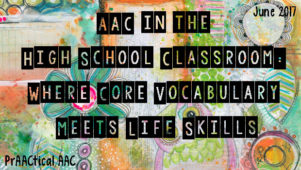
Today, guest blogger Sarah Mueller, a special education teacher in Rochester Michigan, shares her thoughts on supporting core vocabulary learning while working on functional life skills. Sarah teaches high school students with intellectual and developmental disabilities and strives to embed language and communication throughout her students’ entire school experience. Sarah helps her students become strong self-advocates as they prepare for adult life. Marlene Cummings, Sarah’s colleague and mentor, introduces the post. :::::::::::::::::::::::::::::::::::::::::::::::::::::::::::::::::::::::::::::::::::::: I (Marlene Cummings) had the pleasure of meeting Sarah 2 years ago as a new teacher in one of my districts. She immediately engaged in our county level professional learning opportunities in AAC and Literacy. The AAC focus presented strategies to support AAC and language learning including: core vocabulary, aided language input, vocabulary instruction and opportunities. The literacy focus was designed to create and implement a comprehensive literacy program taught by Drs. Karen Erickson and David Koppenhaver. The outcome:... [Read More...]
November 16, 2016
by Carole Zangari -

Have you been tuning into the USSAAC webinar series? If not, this is something to add to your calendar. Offered with the support of ISAAC, this series has had some wonderful speakers and topics. In today’s post, we share the most recent presentation with John Costello as the speaker. Enjoy! US friends, please consider supporting these efforts by becoming a USSAAC member. It is the only US organization to bring together people who use AAC, their families, and professionals from various disciplines. Direct Link to Video: https://www.youtube.com/watch?v=P2vmiH9tqUQ
November 10, 2016
by Carole Zangari -

We’re excited to welcome back SLPs Lori Sanzeri and Chelsea Collins, creators of Core City, to tell us more about implementing this approach. They both work for the NYC Department of Education and created Core City to promote classroom-wide support of AAC. Last month, they introduced us to Core City. In this post, they share some of the ways that they get everyone involved in using and teaching AAC. STAFF TRAINING The most difficult part of training all staff is finding the time. We are fortunate to have a supportive administration that understands the importance of communication and works to find time to allow us to meet for professional development. If you are not afforded this time, our experience has shown us that the most successful staff training occurs by us modeling our strategies while we are working with the children in the classroom. We encourage the following strategies to... [Read More...]
September 7, 2016
by Carole Zangari -
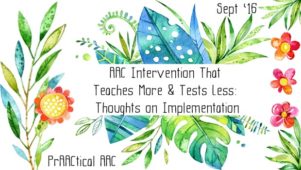
In an earlier post, I shared a graphic on the ways that AAC skills are ‘taught’ versus ‘caught.’ Teaching AAC skills involves the use of specific instructional strategies that give learners information and experiences which result in them being able to communicate more effectively. In many instances, we set out to do just that, but end up with an interaction that ‘catches’ what the student already knows how to do, rather than helping them gain additional skills. There are a few important concepts here. They both have an important role. ‘Catching’ skills isn’t bad. We can do this to figure out what the learner already knows/can do, and give him/her practice with the skill so that it becomes faster and easier to produce. When our interactions ‘catch’ a skill, we’ve created (or taken advantage of) an opportunity for communication. That’s important BUT, it isn’t teaching them anything new. Our learners do... [Read More...]
August 31, 2016
by Carole Zangari -

The month of August is almost over and we’ve saved the best for last. The month wouldn’t seem complete without hearing more of Vicki Clarke’s ideas on AAC assessment. In addition to many other things, Vicki’s practice, Dynamic Therapy Associates, does 50+ of these evaluations each year, both in the clinic and in school settings. In this post, Vicki shares some thoughts on assessing the AAC skills of people who use direct selection. As always, she packs in a lot of information and generously provides the protocol and data collection forms that she uses. You can explore some of her previous posts in the AAC Assessment Corner series here. * ::::::::::::::::::::::::::::::::::::::::::::::::::::::::::::::::::::::::::::::::::::::::::::::::::: AAC Skills Assessment for Direct Selectors I spent the morning with a great group of students at the University of Georgia (UGA) in Dr. Satterfield’s AAC class. I was asked to talk with them about AAC assessment with an emphasis on... [Read More...]
May 19, 2016
by Carole Zangari -
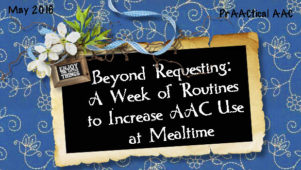
“Waffle.” “I want ___.” “More.” “I’d like a diet coke, please.” “Help.” Most AAC interventionists are quite effective at helping clients use their communication systems during snack or mealtime in order to make requests. How can we move beyond that and help AAC learners communicate for a wider variety of purposes? Mealtimes are wonderful social opportunities and we can take advantage of that by building interaction opportunities around predictable routines. Why build a routine? The predictability helps learners understand what is expected of them. Understanding the expectation sets the stage for active participation. When something becomes a routine, it gets implemented regularly. That gives our learners lots of opportunities to practice their new skills. It also gives us the opportunity to get better at key instructional strategies, such as aided language input, creating explicit opportunities, and using language expansions. Need some suggestions for routines that can be created to foster... [Read More...]
May 5, 2016
by Carole Zangari -
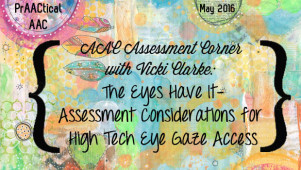
AAC assessment is an area that most professionals struggle with for one reason or another. I am so grateful to Vicki Clarke for returning to share her thoughts on the prAACticalities of conducting these evaluations. If you are looking for tips on assessing someone who needs high tech eye gaze AAC, this post is for you. For other posts authored by Vicki, click here. ::::::::::::::::::::::::::::::::::::::::::::::::::::::::::: The Eyes Have It: Assessment Considerations for High Tech Eye Gaze Access Eye gaze control for AAC device access is a hallmark technological achievement in the world of speech generating devices. For people with significant motor challenges we are no longer limited to scanning as our one choice for AAC access. AAC Specialists have been using light tech eye gaze boards and PVC pipe frames with these friends for years, but now we are able to offer voice output. Eye gaze is for a much... [Read More...]
March 17, 2016
by Carole Zangari -
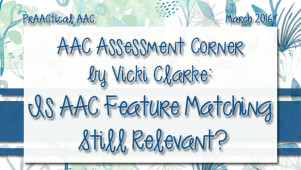
Today, we welcome back Vicki Clarke, a regular contributor to PrAACtical AAC, with another edition of AAC Assessment Corner. In this post, Vicki shares her thoughts on feature matching for AAC device selection. ::::::::::::::::::::::::::::::::::::::::::::::::::::::::::::::::::::::::::::::::::::::::::::::::::::::::::::::::::::: Feature matching has been the gold standard for AAC evaluation for the last 20 years. It is research based and clinically proven as the best technique for selecting an AAC solution for an individual. The tide of real-life practice, however, is turning and there has been increasing discussion at conferences, in social media and blogs questioning why we continue to use feature matching to place AAC systems in the hands of students. In a recent assistive technology on-line chat, a noted AT specialist remarked: “I wonder if at a district level it might not be better to have a go-to AAC system everyone tries first. If that doesn’t work then adjust.” Does this mean that we throw... [Read More...]
February 25, 2016
by Carole Zangari -
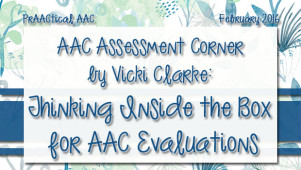
AAC assessment is a challenge in almost every service delivery setting, and many of you have reached out to us to ask for advice on how to strengthen your assessment practices. Luckily, Vicki Clarke, an AAC Chick who has a great deal of experience assessing learners in clinical and educational settings, has tips and resources to share. In this continuation of the AAC Assessment Corner series, Vicki talks about a key feature in any AAC system: vocabulary organization. ::::::::::::::::::::::::::::::::::::::::::::::::::::::::::::::::::::::::::::::::::::::::::::: Thinking Inside the Box for AAC Evaluations: What Type of Vocabulary Organization is Right For Your AAC User? Professionals often spend a great deal of time concerning themselves with which box they should get their AAC user. Should I pick a Prentke Romich or a Tobii Dynavox? But what about the iPad? And what about the money? Should I pick a CheapTalk or a GoTalk instead? Here’s the good news: The box is not the... [Read More...]
December 23, 2015
by Carole Zangari -

There is much to love about these video segments showing adults with intellectual disabilities interacting with their peers and caregivers in a supported community living environment. For starters, we love seeing successful interactions that focus on social connectedness, sharing information and true participation, as opposed to requesting and behavior regulation. Notice the tone of these conversations and the supportive strategies that the caregivers use. The residents are respected, empowered, and successful. And, of course, we love seeing the use of multiple modes of communication! Many thanks to the staff and residents of Inner South Communication Service of Victoria, Australia for making these videos available.









